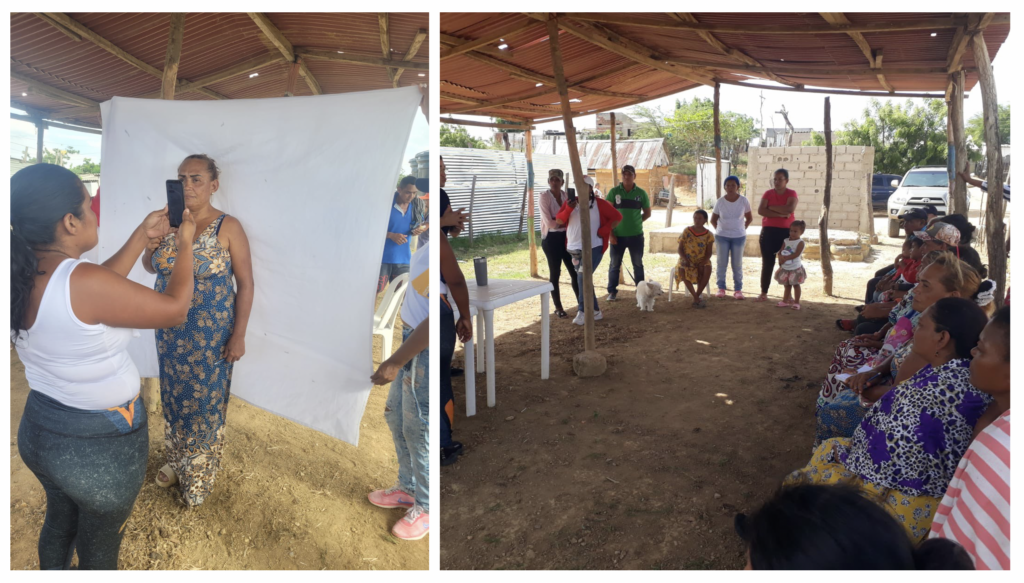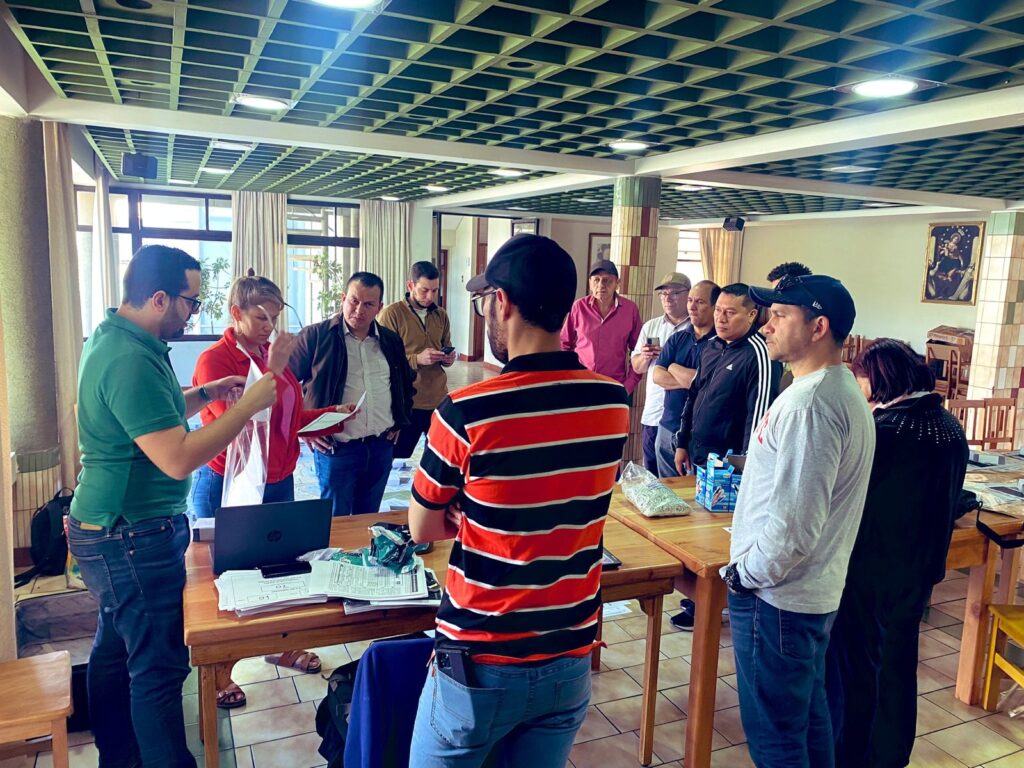Organizing the Venezuelan Opposition Primaries Abroad
NGOs and parties around the world came together to organize an election for hundreds of thousands of dispersed Venezuelan voters


Venezuelans are heading to the polls on Sunday for the opposition’s primary election, the first election in multiple years to generate some enthusiasm among the population and a key opportunity to assess the strength of the different components of an opposition facing particularly difficult times.
To make this happen, the National Primary Commission established the Support Commission for Voters Abroad (CAVE for its initials in Spanish), which coordinated from the registering of voters to the creation of the Primary Election Local Committees, self-run branches in charge of organizing voting centers in each city around the world that had a significant Venezuelan presence.
Juan Pío Hernández, the coordinator of the voting center in Washington D.C, explains to Caracas Chronicles: “CAVE provided the framework for the composition and installation of the local committees, but each committee did the organizational process at its own pace”. The overall structure of a committee included representation of each political party active in the area as well as each active NGOs, adapting to each country’s specific context.
“It’s impressive how excitement and hope don’t die even if you know that you’re going against the current… Even though we know that we don’t have any guarantees, people decide to participate because they feel that it’s the only way they have to connect with the country left behind.”
For example, Patricia Rojas, a member of the Santiago de Chile Local Committee, says that the CAVE’s team in Chile wanted a stronger representation of NGOs. In Mexico City, according to coordinator María de Los Ángeles Léon, they had a stronger party representation: “We have representatives from Causa R, Un Nuevo Tiempo, Primero Justicia, Acción Democrática, and Vente Venezuela. On the other hand, Venemex and the Asochamas association, two long-standing civic organizations, are represented and they are all joined by four independents”. The only strict requirement for internal composition was that each local committee should have a general coordinator, a communications coordinator and a secretary: “The other positions we wanted to create were up to our own criteria. We have a coordinator for the search of electoral centers and an inter-institutional relations coordinator”.
Once local committees were set up, they started to work on the election. In Washington D.C., this process started in July. Hernández, who has been working in coordinating elections for the Venezuelan diaspora since 2006 and is the executive director of the NGO Plan País, says they meet at least once a week until they had to communicate permanently as the event came closer and “we needed to continue talking with other external teams that can support us and knock every remaining door”.
The Local Committee in Madrid had a similar story. According to Natacha Lander, its organization coordinator, the 28-people group hasn’t stopped working since July, working representatives of civil society groups and political parties.

In Mexico, they meet every day, keeping track of the progress through WhatsApp. León emphasized that a key part of their organizational structure was consensus: “If there is a good proposal and nine agree but two don’t, we don’t do it and look for one we all agree on. It’s hard, but also is a plus because once we all agree, we go all in on an idea”. This former party member thinks that commitment to consensus allowed them to navigate through tough political discussions, something they are proud of: “Politics is hard. We have had very difficult discussions, but we have overcome them. So far we are still a compact team, with differences, but we are together in the same boat”.
In Santiago de Chile, the process has had a slightly quicker pace, “even though it doesn’t feel like it sometimes” said Rojas. Chile’s committee is the oldest and is made mostly of civic organizations like the one presided by Rojas, Asociación Venezolana de Chile. There are also unique logistical considerations. Chile is the second country with the most Venezuelan registered voters abroad, and is home to the largest electoral center, the Liceo Arturo Alessandri Palma, with 44,128 registered voters. Originally, Santiago was going to have three centers: “Getting the voting centers was not easy, we couldn’t rent a facility. So, the Municipality of Providencia offered us this center, a large municipal school. The three committees met and decided that there was enough room for the 108 stations needed and that it was convenient, right outside of a subway station at the center of the city”.
Organizers in Mexico City faced a similar concern, but, after a lot of effort, they were able to get a venue: The auditorium of the Universidad Salesiana, where they are now ready to receive over 5,900 voters. This challenge speaks to a broader concern that the local committees have faced: unlike other issues closer to humanitarian concerns like migration, there hasn’t been a lot of support. As Leon put it, “the biggest challenge has been convincing people that we are decent people, that we want the money for the election because people have a lot, a lot of resentment with the political issue”.
They have overcome this by emphasizing financial transparency with all their partners. In Madrid, “representatives of civil society and the Autonomous Government of Madrid have supported us to achieve the objectives”, Lander stated.

In Chile, they recruited volunteers by addressing Venezuelans directly by phone. Moreover, the instability surrounding the process back home has also led to some difficulties. Juan, in Washington D.C, mentioned that this also has impacted motivation: “We all know that this primary process has been plagued by pressures both from the dictatorship to ‘democratic forces’ that don’t want it to happen”. Despite this, he remains optimistic for turnout given that participation has been high in the previous electoral events he has helped organize in the U. S. capital, which has a little over 3,600 voters registered. The excitement is also making its way to Spain: “It’s Venezuelan nature to be a faithful defender of democracy, so an important amount of participation is expected on Sunday, with the 22,662 voters who registered in the process to be able to choose their preferred candidate. For our part, we have worked to guarantee a transparent Election Day”, Lander stated.
As the date approaches, the enthusiasm becomes more palpable in Chile: “People are starting to ask us a lot of questions about how to check if they can participate, where they can vote, how the process will be conducted, so we are noticing that people are very interested in participating”, says Patricia. “The primary is really motivating people to re-encounter the duty of civic participation and that is vital for next year and the challenges ahead”. According to María, that same excitement is being felt in Mexico, both among organizers and voters: “It’s impressive how excitement and hope don’t die even if you know that you’re going against the current… Even though we know that we don’t have any guarantees, people decide to participate because they feel that it’s the only way they have to connect with the country left behind. We don’t know what’s going to happen, but we are looking forward to it. Nobody is going to say that, at least, we didn’t try”.
Caracas Chronicles is 100% reader-supported.
We’ve been able to hang on for 22 years in one of the craziest media landscapes in the world. We’ve seen different media outlets in Venezuela (and abroad) closing shop, something we’re looking to avoid at all costs. Your collaboration goes a long way in helping us weather the storm.
Donate




